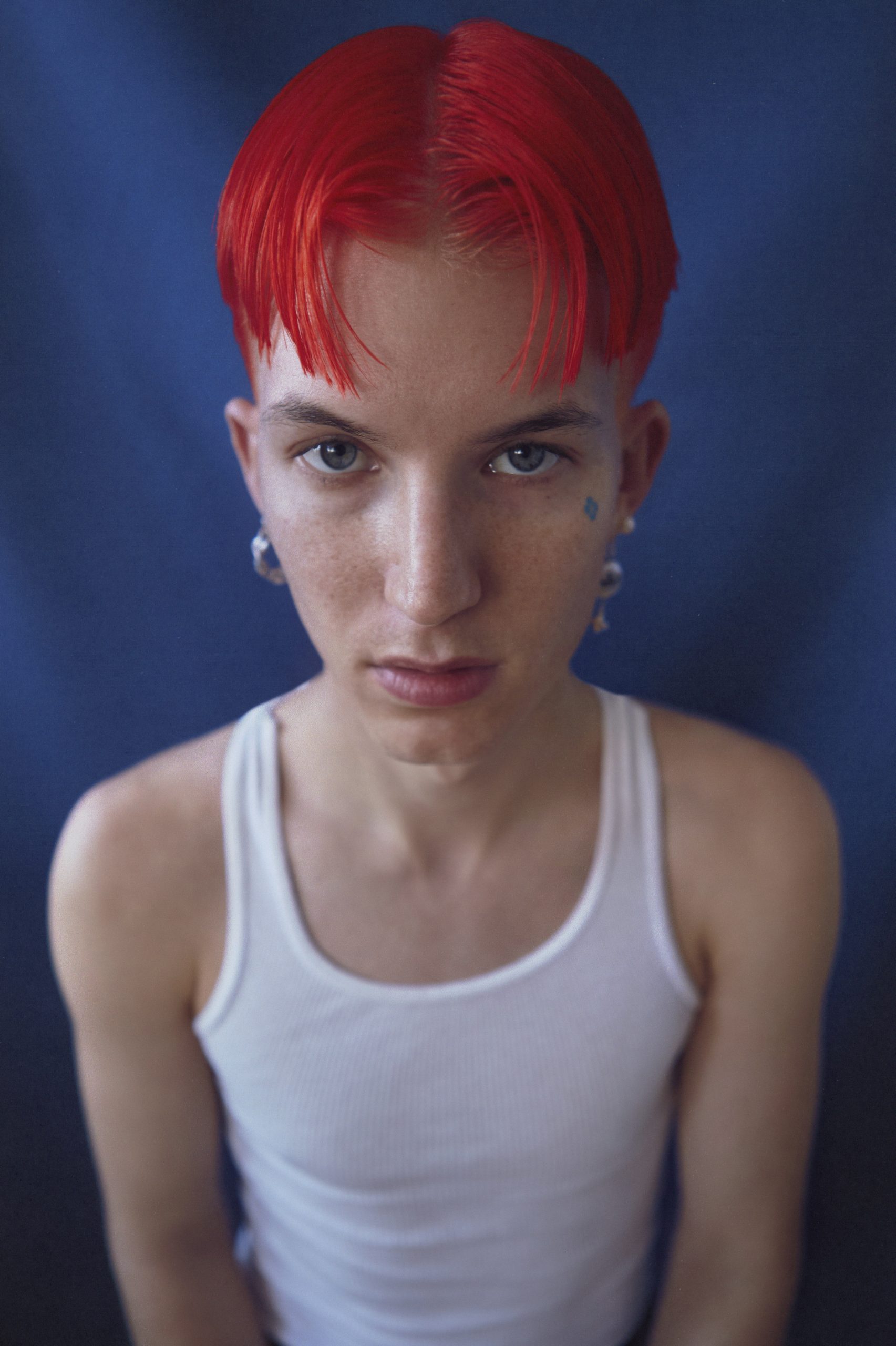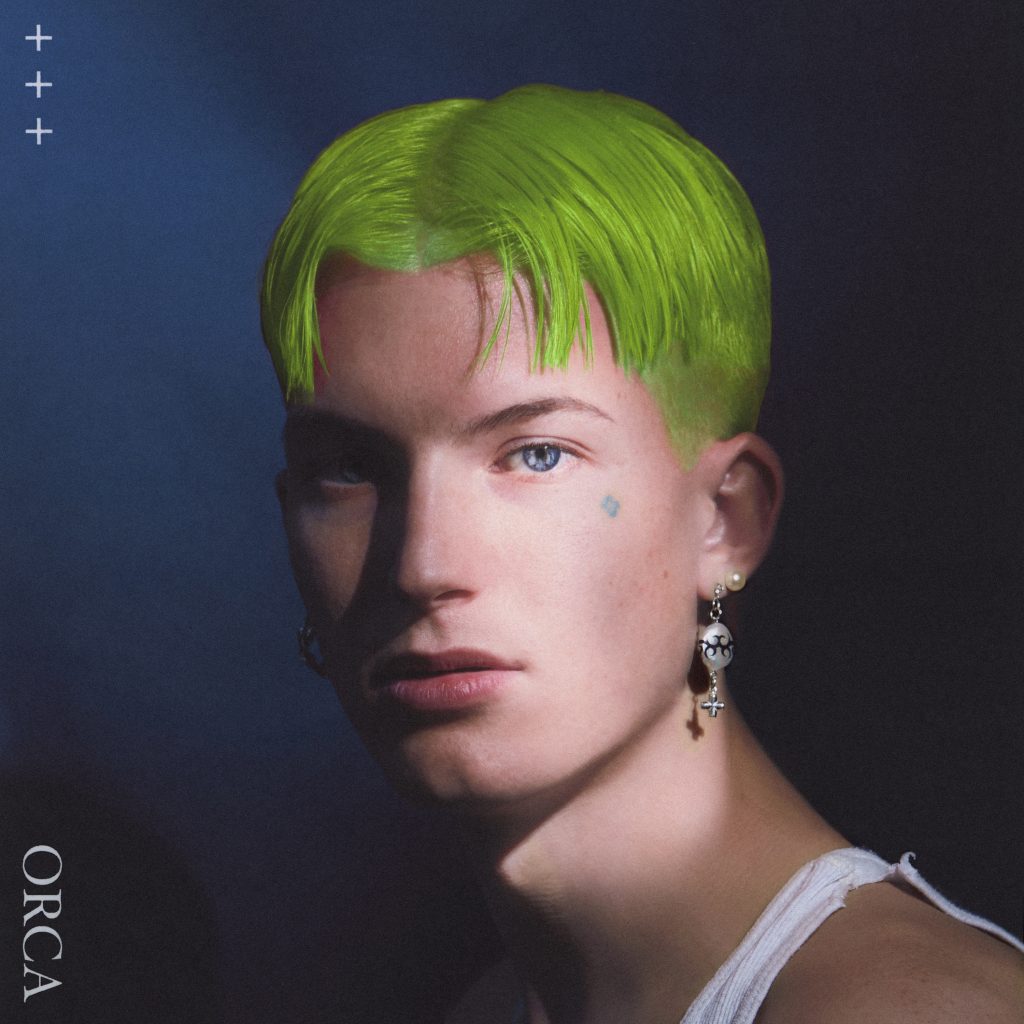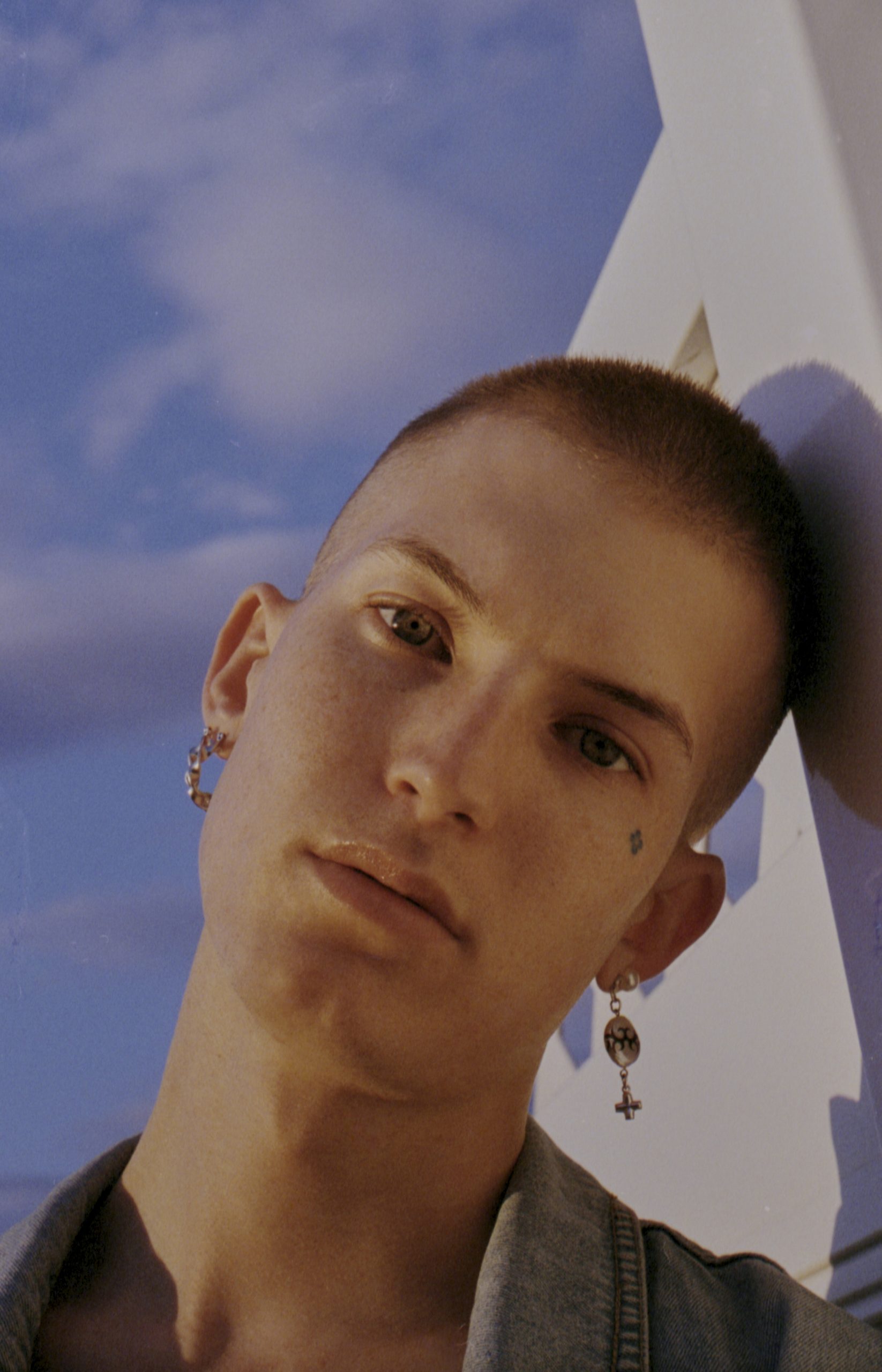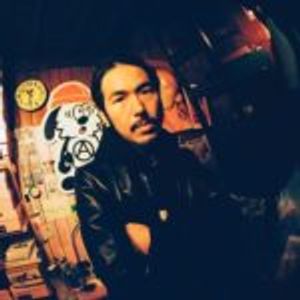In 2019, a singer/songwriter from New York, Gus Dapperton has released his debut album, Where Polly People Go to Read. Even before his glorious debut, he has been reputed undersurface to be the new locomotive of Indie Pop and lauded especially by the youth all around the world.
His quirky style comprised of the colorful hair that has been changing from blue, red, to green, his pastel color outfits, and genderless fashion—He emancipates his creativity and it exudes from his unique look, appearing exceptionally new and fresh to us.
In his second album that has released this year in September, Orca, is chock full of personal narrative, and we can capture his significant transformation as an expressive artist. So, what is music as a form of art to Dapperton? What does he feel like being praised as a Pop icon? What kind of artist is he? —You are about to find out the answers from his words.
The admiring rock stars and artists made the person I am today
――Your second album released this September, Orca, carries out the worldview of the first album, yet we felt that there were more songs depicting your personal stories and dark emotions.
In the past, you have mentioned that making your second album Orca was therapeutic. After completing Orca, do you think the way you express yourself has changed?
Gus Dapperton (Hereinafter Gus): I believe so. My approach to music is slightly different from before. I have various motives for writing songs: One is because it’s merely enjoyable and I have passion towards it. Yet, making this album (Orca) was more of a therapeutic process…
I want to keep making music with more than one reason—
I don’t want to only write songs about love and relationships; I also want to convey what’s happening in the world, the important things around me, and dark themes at times.
Hopefully one day, I can be involved with different projects such as producing other artists or featuring as a guitarist in other artists’ songs.
I’m less eager now in creating more albums—I’m more focused on assessing what each and every music means to me.
――One of the changes for your new album is that you brought Spike Stent for the mixing—You’ve been doing the production all by yourself in the past, so was it different having an outsider onboard for the first time?
Gus: In the past, mixing and mastering had been all done by myself, in a way, I felt obligated to do these tasks by myself; I didn’t quite know how to rely on someone for these processes. Luckily, I honed the skills and became pretty good at producing and mixing.
For the new album, I was introduced to Spike Stent—who I have been a great fan of—through someone we know in common; and we got to work together. After hearing the mix infused with his interpretation, I was instantly satisfied, enthralled and excited. I had only sent him a concise note of the sound I wanted to achieve, but he sent me back the perfect “that’s-the-one!” sound—Like everything I yearned for in the album was already there.
――We could hear Ambient, New Wave, HIPHOP conflated in the music you make. How do you dig tunes?
Gus: There are so many ways (to dig music)—I listen to music recommended by my friends, that my parents used to play often, that I find on YouTube, recommended by somebody… In the old days, I used to go to record stores to buy CDs and records. I would also Shazam the songs or Google parts of the lyrics to search the songs.
I’m very much influenced by New Wave and synth sounds from the 80’s—I’m trying to create something of my own by garnering the pieces of music from different eras and genres.
――What are the roots that compose your style? What kind of music and artists inspired you to become interested in music?
Gus: Since little, I was raised listening to big artists who represent in each generation, like The Beatles, The Smiths, David Bowie, and Michael Jackson. I have not grown up only listening to the 80’s New Wave, but I also listened to 60’s Rock’n’roll and old school Hip Hop—J.Dilla, Madlib, MF Doom to name a few.
――Speaking of 60’s Rock’n’roll, in the past, you have performed “Twist and Shout” during your live set. Would you say your style is also largely influenced by these classics?
Gus: Regarding The Beatles, I’m greatly influenced by them as a songwriter, and both their lyrics and tracks were cutting-edge at that time—They were precursors. My music is overall laidback, but my live set is more towards Rock’n’roll. I perform “Twist And Shout” whenever I can.
――And has it inspired you in any other way, not only in music?
Gus: Of course! Not only Rock’n’roll artists, but musicians in general present themselves as much as they can on stage. I’ve seen many musicians rocking out 100% and that inspires me. Whatever the outcome is I strive to stay true to myself. I would say the admiring “rock stars” and musicians have influenced me and the way I portray myself today.
――Do you get inspirations from movies and TV dramas to express yourself in music?
Gus: Yes, I get inspirations from movies. I think there is a direct correlation between films and music—The structure of the sound and music are very similar. I subconsciously pick up the components from fashion, music, and movies and gradually infuse them into one experience. I wouldn’t say I get directly influenced by the movies, though. I like to concoct and develop the ideas in my head like I’m making my own movie. For instance, when I’m writing a song, I conceive a music video that would fit the song, and visually imagine or come up with a story at the same time. To name a few of my favorite titles, when I was little, I was all about the Harry Potter series. I also loved watching The Sandlot, Donnie Darko, and Ocean’s Eleven. Recently, The Devil All The Time on Netflix was a really good one. In movies that came out a while ago, I enjoyed Waves and Call Me By Your Name.
I choose fashion with my taste. Gender does not matter.
――People admire your fashion. What are your favorite fashion style and brands? And, what are the reasons why you like those style/brands.
Gus: There isn’t a specific style that I go by, but I do have couple favorite brands: Eckhaus Latta, BODE, and COS. These brands have items with the perfect fit for me. Their designs are basic but, for example, they make pants that are slightly high-waist and wide fit and shirts with a beautiful silhouette.
There isn’t one favorite style that I could pick out, but I would say I prefer an oversized fit.
Regarding colors, my preference changes depending on the season, but nowadays, I’m in the mood for green, brown, blue, ashy natural colors. By the way, my current hair color is blue.
――With your blue hair, tattoo, and fashion, a lot of people say your style is genderless. Is that intended? Do you try to achieve the genderless look?
Gus: I don’t particularly try to dress and look genderless. I think fashion is an art form that clearly defines gender. On the other hand, in music, women do not only listen to female singers or men do not only listen to male singers; and it’s the same with movies. However, for some reason, in fashion, women are guided to wear women’s clothes, and men to wear men’s clothes.
I’m not always pleased with how men’s clothes fit me though, and often times, I prefer the fit of women’s pants on me. My friends never care whether I wear a women’s or men’s clothes—They would only complement the way they look on me; they would say, “nice pants!” or “cool shirt!” This is how I’ve always dressed.
Staying bona fide and trying to innovate and enhance the world
――You are now a Pop icon admired by young adults in America. How would you define Pop icon? Also, how do you feel about being called a Pop icon?
Gus: I think Pop icon refers to somebody in the latest mainstream music industry, and I wouldn’t say that’s me, because Pop icon should be someone who is extremely famous, mainstream, and accessible to anyone.
There are times I honestly cannot understand the kids in TikTok, which makes me feel old. However, I do get thrilled when my song is played in someone’s TikTok and people talk about it.
I just think music and art cannot be fabricated on-a-reg in mass. I’m hoping to create something innovative as I stay deeply attached to these art forms.
――It’s an abstract question, but what is music to you?
Gus: For me, music is a common language, but that may not apply to every single person as unfortunately there are hearing-impaired people—They can still feel the vibrations from the music, though. I think music is an universal language that can be communicated across the world.
For example, there are foreign songs that I extremely love but I cannot read their lyrics. I could resonate to these songs as much as those who speak the languages. In that sense, I think music is one of the mediums to connect with people all around the world. Listening to the melody, the singing voice, and being mesmerized by the professional performances—We can easily perceive music without thinking hard at all, and I think that’s what’s incredible about it.
――Now, how would you explain yourself, the artist Gus Dapperton?
Gus: I guess, he is a person who strives to enhance the world of music, and stay true in simply making music and art. I’m not trying to be appealing to anyone—I’m just making music for myself and sharing that to the world; as I’ve been saved by others through music, I wish to make a difference in someone else’s life, too.
I want to continuously stay true in any aspect and play part in improving or innovating the world.
――Now, because of Covid, it’s hard for artists to do live shows. How has the whole Covid situation impacted you, especially after March of 2020? What kind of music would you like to create in the future?
Gus: This January, I had decided to take a time off from touring for a while. Soon after, the pandemic started and consequently the break became longer. It’s been ten months since the last time I performed in front of people. Now, I really miss playing live shows. I’m using this time to look back and study my past performances, though—It’s a good opportunity to find new ways to showcase my performance and connect with people. Actually, I’ve already done three livestreaming shows, and they were so much fun. Livestreaming feels the same as performing live shows. The only difference is that you cannot see the audience’s reactions directly. I also streamed my recorded live show, and watched it with my bandmembers and others, which I really enjoyed and was a new experience to me—I had always wondered “how would it be if I were to enjoy my own show as an audience?”
In the future, I would like to challenge on making film scores, and make instrumental or ambient music that would go well with the visuals.
Gus Dapperton
A singer/songwriter from New York. A 23-year-old, as of year 2020. As soon as he debuted, he immediately won the hearts of the youth all around the world and has been extolled as the Gen Z Pop icon. Released his 2nd album, Orca in September, 2020.
http://gusdapperton.com/
Instagram:@gusdapperton
Translation Ai Kaneda




